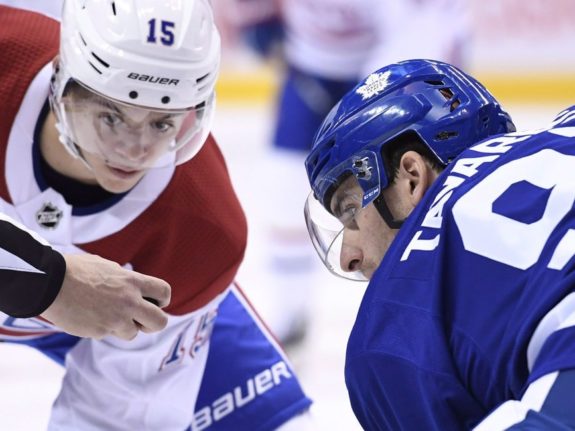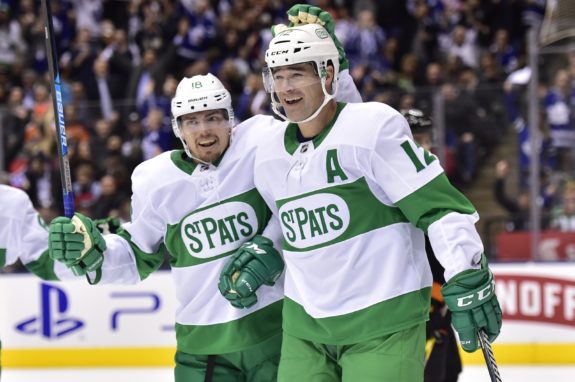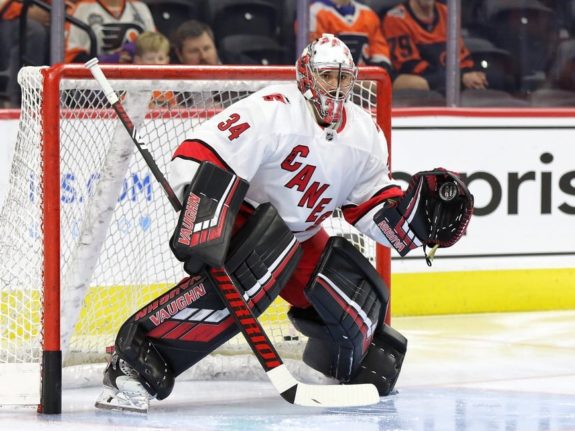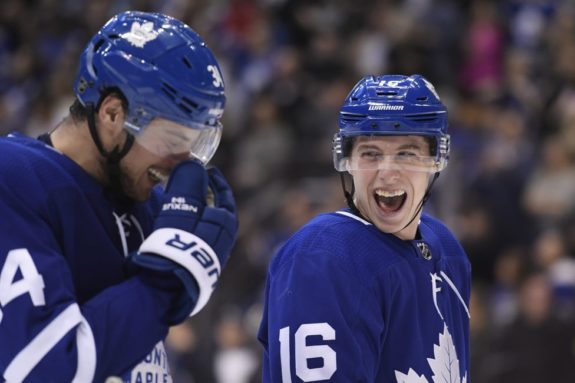When free agency comes around, the Toronto Maple Leafs always have some extra eyes on them. When you’re one of the biggest markets the league has to offer, let alone a polarizing one like the Maple Leafs, there’s always going to be some extra pressure to make a big splash from the media and the fans alike.
When the team was in its rebuilding period, there was obviously less pressure knowing that it wouldn’t be making any noise in the postseason. Even in the first few years of the Auston Matthews, Mitch Marner, and William Nylander era, Toronto wasn’t expected to make any big splashes, considering the core was a work in progress.
When the Maple Leafs signed John Tavares in July 2018, that all changed. Adding a top-ten, maybe even top-five centre in the league to the mix is bound to come with some expectations, and you could argue that summer was the beginning of the downfall. Fast forward three years, and the Leafs suffered their fifth first-round exit in a row, and went into another offseason asking the same questions again. Where do you improve? Who do you trade? Who do you bring in to ensure that this doesn’t happen again?

I’ll be blunt about it; nothing. Well, not nothing. The Leafs did make some notable free agent signings this year including goaltender Petr Mrazek and forwards Michael Bunting, Ondrej Kase, and Nick Ritchie. As always, there was a collection of fans that voiced their displeasure over the Leafs’ lack of a big splash this season.
And truthfully, I get it. A big-ticket free agent signing is usually all it takes to win the fans over again and get them fired up for the start of the season. But make no mistake, signing a Dougie Hamilton or a Jaden Schwartz ahead of next season would not have solved the Leafs’ playoff woes any more than Tavares did, despite making the team better. Allow me to explain.
The Best Roster Doesn’t Mean the Best Playoff Team
Let’s take a look at some of the team’s biggest free agent signings dating back to the 2016 offseason, the summer before Matthews and Marner made the jump. The Leafs were quiet in free agency, with Matt Martin being their biggest signing. This made sense, considering nobody knew what this new, young Leafs team would be capable of.
The Leafs made the playoffs in 2016-17, which prompted management to shoot a little higher the following season. Their biggest signing of the offseason was San Jose Sharks legend Patrick Marleau, who was brought in on a three-year contract. A popular veteran, capable of 20 goals, and a good mentor for the team’s young stars. Enough to get the fans excited, but nothing jaw-dropping.

After making the playoffs again in 2017-18, and cementing themselves as a playoff team in the Atlantic Division, the Leafs made their first big splash with the Tavares signing. When you bring in a hometown player with Tavares’ pedigree, you’re making a statement. The Leafs certainly intended to, but the results they’ve been hoping for haven’t come yet.
After yet another first round exit in 2018-19, the team’s big move that offseason was acquiring Tyson Barrie and Alex Kerfoot for Nazem Kadri. On paper, this trade looked great. They gained a third-line centre who was both four years younger and $1 million cheaper than Kadri, and added a 50-point right-handed defenseman in the process. But….spoiler alert. They were eliminated early again, this time in the play-in round for the 2020 playoff bubble.

If you’ve been following my work in the past few months, you know that I’ve been very vocal about how the issues lying with this team are mental and nothing else. Last year was the picture perfect example of that. They addressed their defense by signing T.J. Brodie and Zach Bogosian. They addressed their need for grit by signing Wayne Simmonds and trading for Nick Foligno. They even touched up on the leadership front, signing a legend in Joe Thornton.
For the first time in my years watching hockey that I can remember, the Leafs seemingly didn’t have a single flaw heading into the playoffs. And, yet, they threw away a 3-1 series lead to lose in seven games versus a team that had a losing record going into the postseason. So now we’re supposed to believe that signing someone like Hamilton will magically cure their inability to perform when it matters most?
Leafs Still Have Value in New Additions
This may seem like a contradiction compared to what I just said, but the Leafs still had themselves a good offseason despite the lack of a big name. While they didn’t add an instant impact player, they signed a lot of low-risk contracts with potential to maximize their value considering the cap-crunch they’re in.
After the down-year Frederik Andersen had between the pipes, they arguably improved in net with the signing of Mrazek. Bunting is about as low a risk as you can get, and arguably has the highest potential reward of any other signing. Kase is a sneaky option for a rebound year after only playing three games in 2020-21, and could carry 20-goal potential.

Ritchie is a former first-round pick who’s coming off a 15-goal season, can help provide some of the grit and physicality left following Zach Hyman’s departure, and chip in some offense along the way. They also added David Kampf, who is known to be an elite defensive centre with strong faceoff ability.
I’m only scratching the surface with the expectations for these guys, but the one thing they all have in common is that if any of them don’t pan out, the contracts can easily be buried. Well, besides Mrazek. Still, general manager Kyle Dubas has always been known to add more forwards than the team can ice at once for this exact reason. The more options you have, the better. And we’ve seen during the regular season that offensive production isn’t an issue, at least when you have the players the Maple Leafs do up front.
The Stars Need to Get it Done
If you watched the series against the Montreal Canadiens, you would know that there was a severe absence from two of the Maple Leafs’ most dangerous players for most of the series. Matthews and Marner finished with five and four points in seven games, respectively. Those totals may not look terrible, but most of them came in the Maple Leafs’ 5-1 win over Montreal in Game 2.
Look. I’ve eased up on my criticism towards Matthews and Marner as time has passed. This team has not seen homegrown talent like these two players in years, and giving up on them before either of them turn 25 would be a terrible decision. Having said that, the team needs more from them or they won’t be achieving anything in the postseason.

Dubas showed his faith in Matthews and Marner early on, and the proof is in their contracts. The fact is, Dubas didn’t pay them $11 and $10 million, respectively, to be regular season superstars. When you’re making that kind of money, and putting on the shows they have been during the regular season, the same is to be expected when the stakes are high. And so far, the results haven’t been there. Plain and simple.
Some people attribute the Maple Leafs’ first round exit to the fact that they lost Tavares 10 minutes into Game 1. There’s some merit to this, of course. Seeing your captain go down with an injury in gruesome fashion like Tavares did is a massive blow both on the ice and to the team’s morale. But Stanley Cup-winning teams all have one thing in common. They show resilience when they’re faced with adversity and take it in stride.
With Tavares out no more than a fraction into Game 1, Matthews and Marner had the perfect opportunity to step up and take control of the series, but they didn’t. Sure, they came back strong the next game. But they could have used either of those two guys stepping up and putting the team on their backs in any of Game 5, Game 6, or Game 7. Instead, they found themselves hanging their heads and answering the same old questions to the media.
Overview
If anything, this offseason tells me that the message sent from Dubas to his players is simple; “This is your team now, so get it done”. This year, there’s no shiny free agent to distract the fans. There’s no father figure like Thornton to fall back on. The training wheels are off, and the fate of this team lies in the hands of the guys it was built around.
If the Leafs fizzle out in the first round again next year, I honestly don’t know what the next step would be besides to trade a big-name player, and send a tidal wave through the locker room. At this point, all fans can do is hope that the mindset of players with little security like Bunting and Kase is infectious to the big guns. And as Maple Leafs fans, we are certainly no strangers to hope.
